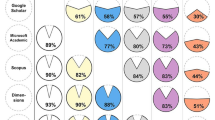Abstract
The use of distributed (Internet) resources to enhance both traditional and distance education has caused much excitement in the science education community. However, one of the difficulties with relying on such freely available distributed resources has been the lack of certainty that the resources will be available for students next month, next semester, or next year. We have recently been involved in the development of three graduate-level biochemistry courses designed for high school teachers. Development of these courses relied heavily upon distributed science education resources. As a consequence, they represented a set of authentic science education resources that could be monitored over time to determine their rate of extinction. In total, the three courses contained 515 nonredundant URLs representing either scientific content of science education pedagogy. These have been monitored on a monthly basis during the 14 months since the creation of the courses (August 2000). During this period 85 (16.5%) of the URLs have ceased to function or had their content changed. The most attrition was seen in URLs with the “edu,” “com,” and “org” domain names, in which 17.5, 16.4, and 11% have already become inaccessible.
Similar content being viewed by others
REFERENCES
retention/20018.htm
Davis, H. C. (1999). Hypertext link integrity. ACM Computing Surveys 31(Suppl.): U164-U168.
Fowler, S. L., Novack, A. M. J., and Stillings, M. J. (2000). The evolution of a manufacturing Web site. Computer Networks-The International Journal of Computer and Telecommunications Networking 33: 365-376.
Kobayashi, M., and Takeda, K. (2000). Information retrieval on the Web. ACM Computing Surveys 32: 144-173.
1998-04/graphs/use/q6.htm
van Harmelen, F., and van der Meer, J. (1999). WebMaster: Knowledge-based verification of Web-pages. In Multiple Approaches to Intelligent Systems, 12th International Conference on Industrial Engineering and Applications of Artificial Intelligence and Expert Systems. Vol. 1611, pp. 256-265.
Author information
Authors and Affiliations
Corresponding author
Rights and permissions
About this article
Cite this article
Markwell, J., Brooks, D.W. Broken Links: The Ephemeral Nature of Educational WWW Hyperlinks. Journal of Science Education and Technology 11, 105–108 (2002). https://doi.org/10.1023/A:1014627511641
Issue Date:
DOI: https://doi.org/10.1023/A:1014627511641




